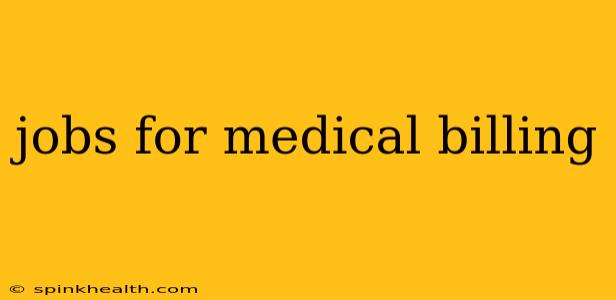Navigating the World of Medical Billing Jobs: A Career Path Story
The crisp white coat, the hushed reverence of a hospital corridor – these images often come to mind when we think of healthcare. But behind the scenes, a vital cog keeps the entire system running smoothly: medical billing. This isn't just about numbers; it's about ensuring doctors and hospitals get paid for the services they provide, ultimately supporting patient care. And within this field, a surprising variety of jobs awaits.
My journey into the world of medical billing started unexpectedly. I was initially drawn to the healthcare industry by a desire to help people, but I quickly discovered that my analytical skills and attention to detail were better suited to a behind-the-scenes role. This led me to medical billing, and I haven't looked back since. The field isn’t glamorous, but it’s incredibly rewarding, offering a stable career with opportunities for growth.
Let's explore the landscape of medical billing jobs, addressing some common questions along the way.
What are the different types of medical billing jobs?
The medical billing field offers a diverse range of roles, catering to various skill sets and career aspirations. You can find positions focused on specific tasks or encompassing a broader scope of responsibilities. Some popular options include:
-
Medical Biller: This is the entry-level position, often involving data entry, claim submission, and following up on denied claims. It’s a great starting point for those new to the field, allowing you to learn the basics and develop essential skills.
-
Medical Coder: Coders translate medical procedures and diagnoses into standardized codes (like ICD-10 and CPT codes) used for billing. This requires a strong understanding of medical terminology and anatomy. While distinct from billing, it’s a closely related field often found within the same organizations.
-
Medical Billing Specialist: This role often involves a wider range of responsibilities, encompassing both coding and billing tasks. Specialists handle everything from claim processing to patient statements and payment posting.
-
Medical Billing Manager/Supervisor: These positions involve overseeing a team of billers and coders, ensuring accuracy, efficiency, and compliance. They require strong leadership and management skills.
-
Revenue Cycle Manager: This high-level role focuses on the entire revenue cycle, including billing, coding, collections, and patient registration. It requires a deep understanding of healthcare finance and operations.
What are the required skills for a medical billing job?
Success in medical billing requires a blend of hard and soft skills. Employers commonly seek candidates with:
- Strong computer skills: Proficiency in medical billing software is essential, as is familiarity with various electronic health record (EHR) systems.
- Knowledge of medical terminology and coding: Understanding medical procedures and diagnoses is crucial for accurate coding and billing.
- Attention to detail: Accuracy is paramount in medical billing, as errors can lead to delays in payments or even legal issues.
- Organizational skills: Managing a large volume of data and tracking claims requires excellent organizational abilities.
- Communication skills: Interacting with patients, insurance companies, and other healthcare providers requires clear and professional communication.
- Problem-solving skills: Identifying and resolving billing issues requires analytical and problem-solving skills.
What education or certifications are needed for a medical billing job?
While a college degree isn't always mandatory, many employers prefer candidates with at least an associate's degree in medical billing and coding or a related field. Certifications, such as the Certified Professional Coder (CPC) or Certified Professional Biller (CPB), can significantly boost your job prospects and demonstrate your expertise. Many community colleges and vocational schools offer comprehensive training programs.
What is the job outlook for medical billing jobs?
The job outlook for medical billing and coding is generally positive. The growing complexity of healthcare billing and the increasing use of electronic health records continue to create a demand for skilled professionals in this field. The Bureau of Labor Statistics projects significant growth in related occupations in the coming years.
How much do medical billing jobs pay?
Salaries vary significantly depending on experience, location, and job responsibilities. Entry-level positions typically offer a modest salary, but experienced professionals and those with management responsibilities can earn considerably more. Online salary resources can provide more detailed information specific to your location and experience.
My journey through the world of medical billing has been one of continuous learning and professional growth. It's a field that rewards dedication, attention to detail, and a commitment to accuracy. If you possess these qualities, and you're passionate about the healthcare industry, a career in medical billing might just be the perfect fit for you.

